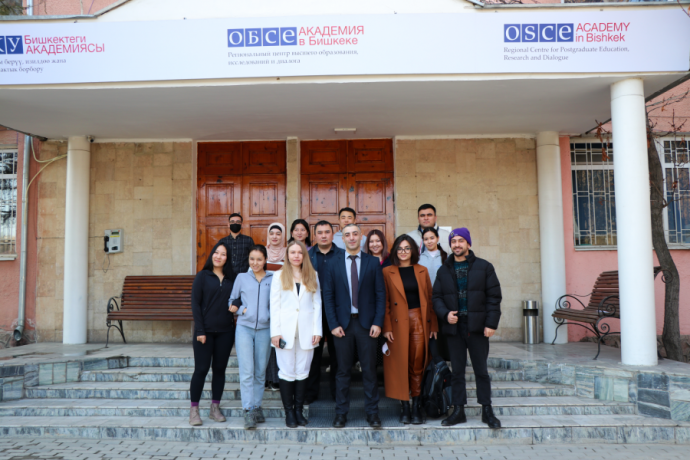

On 21 of February 2022, Mr. Giorgi Beridze, Lieutenant-Colonel, Project Coordinator of the Law Enforcement in Central Asia (LEICA), visited the OSCE Academy in Bishkek to meet students of MA Programme in Politics and Security and deliver the lecture ‘First EU Project on Counter Terrorism and Combating Radical Extremism in Central Asia.’ This lecture was a part of the course ‘Contemporary Security Issues’ taught by Dr Elena Zhirukhina within MA Programme in Politics and Security.
In his interactive lecture, Mr. Beridze introduced students to the LEICA’s aims, structure and activities, and the nature of capacity building projects. He specified that LEICA focuses on providing trainings, seminars, workshops, conferences, and study visits to share the best EU expertise in counterterrorism (CT) with partners in Central Asia.
LEICA’s activities are divided in four blocks, explained Mr. Beridze. The first block deals with prevention by means of anti-radicalisation measures at the societal level but also in governmental institutions, particularly, in penitentiary system and law enforcement. The second block covers threat assessment and investigations aiming at preventing and countering terrorists use of Internet and malicious activities on darknet, as well as developing the specialised skillset in digital investigations to name a few. The third block concentrates on preparedness and response enhancing the forensic capacity of responsible state agencies, including trainings on dealing with attacks involving explosives and the use of chemical, biological, radiological and nuclear (CBRN) materials; as well as techniques on hostage negotiations. The fourth block combines activities on monitoring and control covering sensitive issues regarding foreign terrorist fighters and their families who returned to Central Asia or has a potential to do so. Mr. Beridze emphasized that compliance with human rights regimes is extremely important at every step of law enforcement and judicial work in the CT context. No less important is it to consider the gender implications and design gender-sensitive programming.
The key element of capacity building projects and effective CT actions, noted Mr. Beridze, is to build partnerships: inter-institutional contacts at the national level; contacts between the responsible state agencies of Central Asian states; contacts with regional and international organizations. Such contacts stimulate trust-based relations and efficient information exchange that can be central in CT operations. LEICA inter alia facilitates this process through its national and regional activities that can lead to establishing robust partnerships between key stakeholders.
Having been launched in 2020, continued Mr. Beridze, LEICA faced multiple challenges during its work including health hazards and logistical restrictions due to the COVID-19 pandemic, geopolitical complications due to the revolution in Kyrgyzstan in October 2020, the border conflict between Kyrgyzstan and Tajikistan in spring 2021, the Taliban takeover in Afghanistan in August 2021, the civil unrest in Kazakhstan in January 2022. As the situation remains dynamic and terrorist threats present, the capacity building programs, such as LEICA, serve to improve preparedness and response of state institutions engaged in countering terrorism in Central Asia.